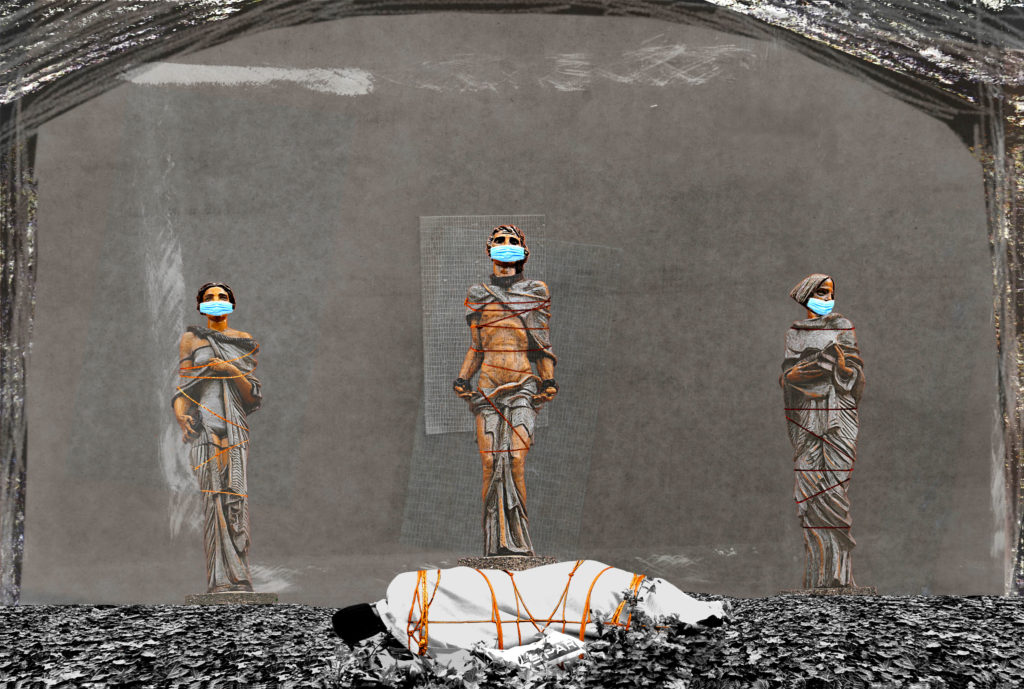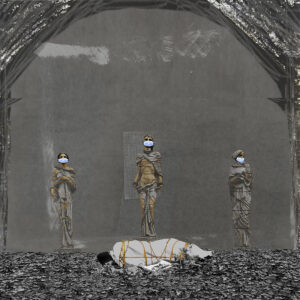A new paradigm is emerging: the nature and scale of risks are changing. The assumption that past observations may help to better appraise future developments becomes questionable due to an anthropogenic metabolism of systemic risks making obsolete our linear way of thinking (1). The abnormal becomes the new norm, shifting to a deadly scenario of inability to manage risks when not having the capability to rethink our current models. Unfortunately, there is no need of crystal ball to see that the temptation to return to old demons will be as strong as the collapse we are currently facing. The political willingness needed to oppose a bounce-back from the current abnormality to the past norms seems out of scope. Unless new narratives help to build the missing link…
It is not by chance if the past months have seen actions promoting and defending the role of Culture and Art in building urban resilience. The awareness that the 17 SDG’s (2) do not highlight the role of Culture has triggered initiatives to reshape the 2030 agenda (2) around cultural rights, diversity and creativity. More recently, the Rome charter (3) has presented the cornerstone of cultural capabilities to be enshrined in public policies, underlining the inextricable link between Culture, human rights, democracy and sustainability. Such initiatives show the crucial role of Art and Culture and how it introduces new narratives enabling a better understanding of the threats and challenges citizens may face (4).
However, well-intentioned they may be, such institutional commitments will not have the desired effects if we cannot find the collective means to link Art and Culture to the most vulnerable of us. As with any risk, they are the first to be impacted by the pandemic. And as with any risk, urban resilience makes no sense if it does not build a model based on equity, justice and dignity. Forgetting such inclusive dimension would restrict its scope to risk management, a necessary but not sufficient condition to improve our common well-living and wellbeing.
Amazing bottom-up initiatives have been brought to life over the past years but many of them have been stopped or are threatened by the pandemic. In France, the “Inpact collectif” (5), has supported creative initiatives with 162 projects from 2012 to 2019 mostly committed to bring the world of Culture to deprived people. In the UK, “Get Creative” (6) is dedicated to use artistic skills for self-esteem and confidence improvement with the homeless. In Japan, poet Ueda Kanayo (7) has done an incredible work with her experiment “Cocoroom”, using artistic expressions to fight neighborhood isolation.
We are facing collectively an enormous challenge. Online alternatives cannot guarantee for everyone the equal access to cultural participation. There is an absolute need to restore the physical and social urban fabrics by putting Culture at the center of our recovery process. The statement of Culture Action Europe (8), stressing the need not to compromise any longer with budget cuts, is welcome. But our task goes far beyond. We need to realize that we have created a pandemic that threatens the essence of humanity (9). We need to learn the meaning of “resilience thinking” and acknowledge the pedagogical role of Art. We need to see Culture as a sense of belonging when the livability of our environment is at stake.
The below photographic work (*) is the outcome of a stay in Vienna, Austria. Culture, contaminated by the Covid, is represented by three statues of the Karl-Marx-Hof, “Körperkultur”, “Befreiung” and “Aufklärung”, wearing face masks and standing in front of a homeless, as among the most vulnerable of us. All of them are enchained with ropes as an allegory of the urban resilience failure when the required role of Culture in our society is not met.
(*) This work is dedicated to Eva V., getting out the homelessness deadlock when I met her and so proud to show her “Kultur Pass” enabling a free access to the city museums. Hunger auf Kunst & Kultur.

- https://www.preventionweb.net/news/view/71228
- http://www.agenda21culture.net/sites/default/files/culturesdgs_web_en.pdf
- https://www.2020romecharter.org/
- https://www.resi-city.com/art-as-a-pedagogic-tool-for-urban-resilience/
- http://www.inpact-culture.org/accueil.html
- https://www.homeless.org.uk/our-work/resources/arts-for-all
- http://field-journal.com/issue-7/1768
- https://cultureactioneurope.org/news/ensuring-culture-fulfills-its-potential-in-responding-to-the-covid-19-pandemic/
- https://ipbes.net/pandemics
